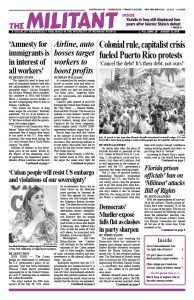As competition for markets among bosses in airline, auto and other industries continues to sharpen, company chiefs say they are looking to “cut labor costs,” targeting workers for concessions and weakening union rights.
Contract talks opened in mid-July between the United Auto Workers and the “Big Three” — General Motors, Ford and Fiat Chrysler. The bosses are seeking to raise workers’ health care payments and increase use of temporary workers, among other issues. Contracts for the three companies, which employ nearly 150,000 UAW-represented workers, expire Sept. 14.
Bosses hope that with few strikes in the industry in recent years their assaults will be met with little union resistance. But convincing workers to accept more concessions may not be so easy for the auto bosses warns the Wall Street Journal.
It quotes Mike Daniels, a GM factory worker hired in 2013, who told the paper the union must fight for base-wage increases to close a pay gap imposed on new hires under earlier contracts, as well as pensions and guaranteed work for plants the company plans to close. “I’m standing my ground, and I’m drawing the line,” he said.
Amid slumping sales, auto bosses seek to recoup their profits through laying off more workers. GM has shuttered its plant in Lordstown, Ohio, with plans to idle three more. Honda recently ended a shift at its plant in Marysville, Ohio. Nissan earlier this year eliminated a production shift at its truck plant in Mississippi. On July 25 the company announced plans to cut over 1,400 jobs in the U.S. — part of eliminating 12,500 jobs worldwide, 9% of its workforce.
While sales of new cars and trucks rose steadily from 2009 to 2016, sales to individuals are now falling. Some car dealers’ are cutting inventories and ordering fewer vehicles.
Meanwhile, auto finance companies have been pushing subprime loans with high interest rates, making it increasingly difficult for workers to cover these payments as well as the original cost of the vehicles. According to Bankrate, more than 50 percent of auto loans go to subprime borrowers.
Repossessions are up as the number of people “seriously delinquent” on car loan payments is at record levels.
Airline mechanics fight outsourcing
For nearly four years mechanics, members of the International Association of Machinists, have been pressing for a contract at American Airlines. One of the main issues in dispute is the company’s plan to outsource the jobs of 5,000 union maintenance and fleet service workers, union spokesman Joe Tiberi told the media.
As part of their drive against labor, the airline in May filed a lawsuit against the union claiming workers were slowing operations by completing tasks more slowly and refusing to take overtime shifts, which union officials denied.
In May, after a seven-year fight some 2,500 mechanics represented by the Aircraft Mechanics Fraternal Association approved a new contract at Southwest. Wages immediately increased by 20 percent with 3 percent annual raises. Bosses there also sued the union claiming it organized a slowdown forcing the airline bosses to cancel hundreds of flights.
The pilots’ union is beginning or preparing to negotiate with the four biggest U.S. airlines — American, United Airlines, Delta Air Lines, and Southwest Airlines. The results impact contract talks with other groups employed by the airlines. Flight attendants at American are also negotiating their next contract.
At the O’Hare International Airport in Chicago workers employed by contract companies Scrub Inc. and Prospect Airport Services won their fight for union representation. Cabin cleaners, baggage handlers, cargo agents and wheelchair attendants joined airport protests over the past three years to press for wage raises. The actions were organized by Service Employees International Union Local 1. The union announced July 17 that it has now signed contracts with these companies that raise wages and benefits for these 2,200 workers.

